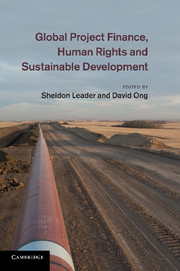Book contents
- Frontmatter
- Contents
- contributors
- Abbreviations
- Part I The framework
- Part II Special topics
- Part III Case studies
- 11 The implications of the Chad???Cameroon and Sakhalin transnational investment agreements for the application of international environmental principles
- 12 Project finance arrangements for the Baku???Tbilisi???Ceyhan project
- 13 The Orion and CMB pulp plants in Uruguay
- 14 The Newmont and AngloGold mining projects
- 15 Overview and recommendations
- Index
- References
13 - The Orion and CMB pulp plants in Uruguay
Published online by Cambridge University Press: 07 September 2011
- Frontmatter
- Contents
- contributors
- Abbreviations
- Part I The framework
- Part II Special topics
- Part III Case studies
- 11 The implications of the Chad???Cameroon and Sakhalin transnational investment agreements for the application of international environmental principles
- 12 Project finance arrangements for the Baku???Tbilisi???Ceyhan project
- 13 The Orion and CMB pulp plants in Uruguay
- 14 The Newmont and AngloGold mining projects
- 15 Overview and recommendations
- Index
- References
Summary
Introduction
What are the links between project finance (PF), foreign direct investment and sustainable development and human rights issues? To what extent does the use of PF accentuate the positive and/or negative impacts of foreign direct investment on sustainable development and human rights and through which channels?
The question can be answered in part by looking, as this chapter does, at links between the due diligence process of PF institutions involved in the financial arrangements and examining their potential impact on sustainable development and human rights issues. The ‘due diligence’ process is an interdisciplinary process of analysing legal, technical, environmental, social and financial risks designed to detect events that might result in total or partial project failure. Financial institutions therefore might affect the sustainable development impacts of a project by making loans or guarantees conditional on a borrower’s compliance with certain environmental, social and/or human rights standards.
- Type
- Chapter
- Information
- Global Project Finance, Human Rights and Sustainable Development , pp. 416 - 461Publisher: Cambridge University PressPrint publication year: 2011



